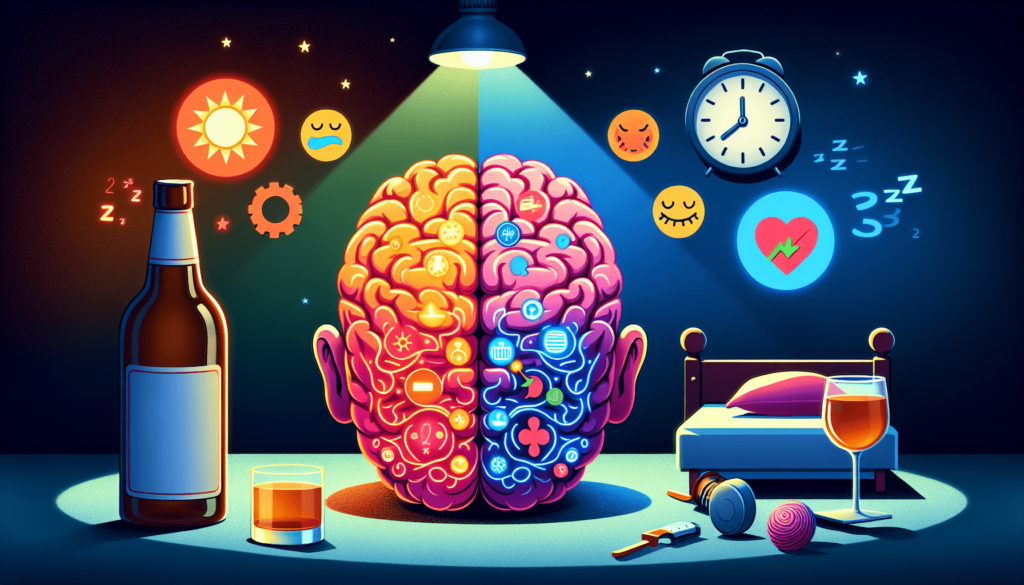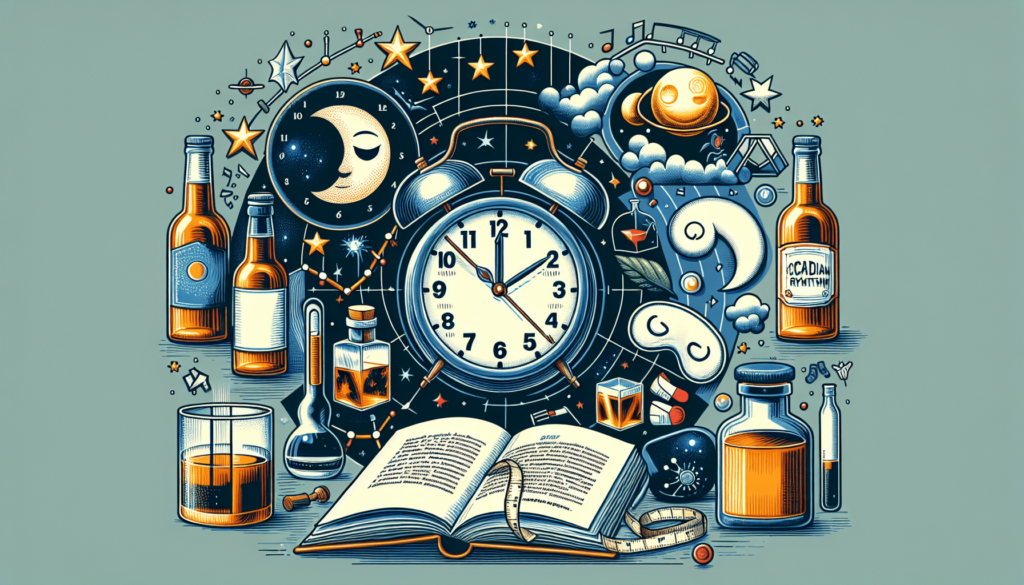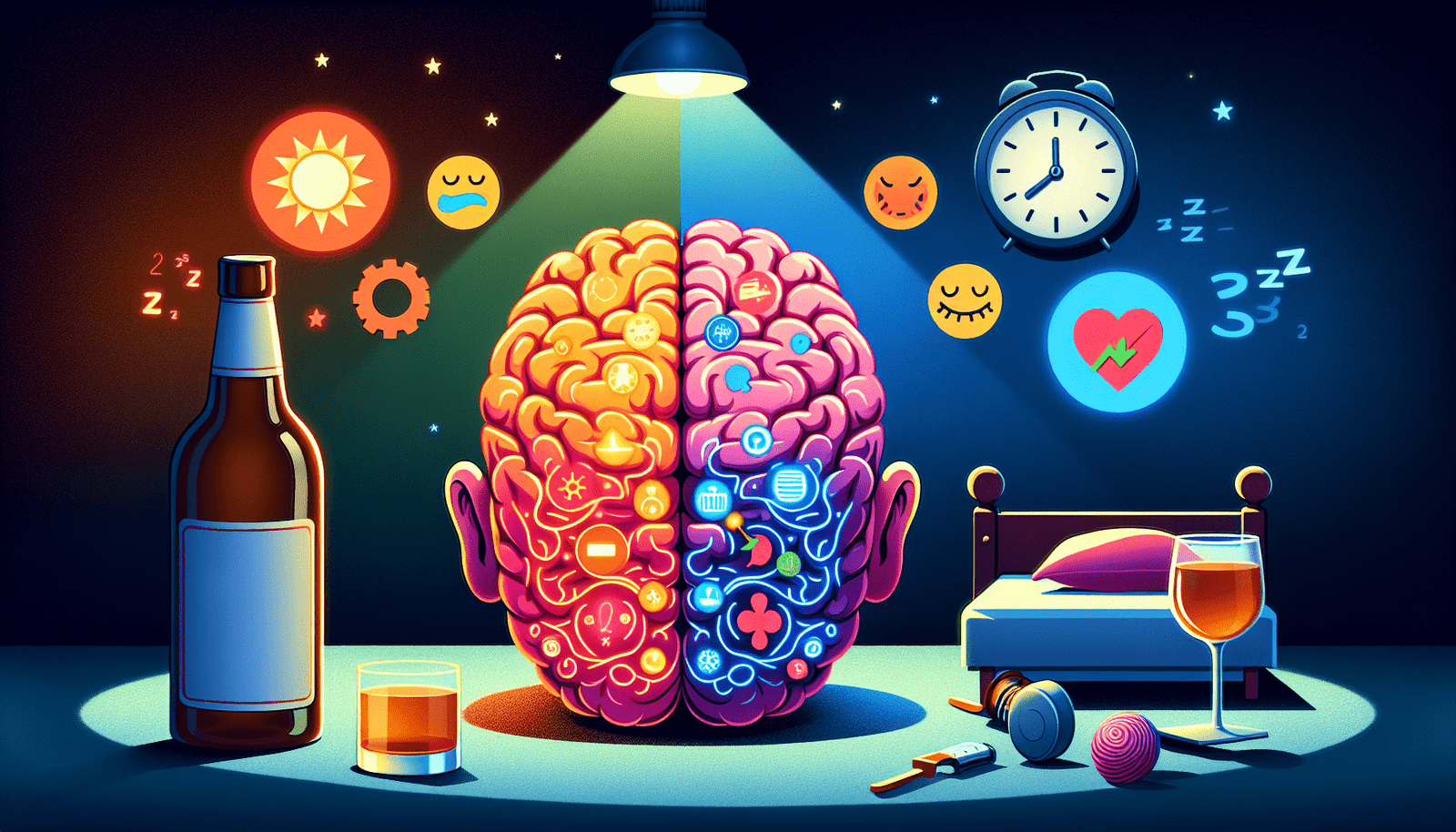So you’ve had a few drinks before bed and now you’re wondering why you’re not getting a solid night’s sleep. Well, let’s break it down – alcohol and sleep have a complicated relationship. While it may initially make you feel drowsy and ready to hit the pillow, alcohol actually disrupts your sleep patterns, leading to a restless night and leaving you feeling groggy the next day. But why does this happen? Let’s take a closer look at how alcohol affects your sleep.

Alcohol and Sleep Patterns
When it comes to sleep, alcohol can have a significant impact on our sleep patterns. While it may seem like a nightcap before bed can help you sleep better, the truth is that alcohol can disrupt the natural stages of sleep.
Disruption of REM Sleep
One of the most noticeable effects of alcohol on sleep is the disruption of REM (rapid eye movement) sleep. REM sleep is the stage in which we experience vivid dreaming and is crucial for cognitive function and emotional well-being. However, alcohol consumption can suppress REM sleep, leading to a lack of dream recall and potentially contributing to mood disturbances.
Effect on Slow Wave Sleep
Alcohol can also negatively affect slow wave sleep, also known as deep sleep or N3 sleep. This stage of sleep is characterized by slow brain waves and is essential for physical restoration and growth hormone release. However, alcohol has been found to reduce the duration and intensity of slow wave sleep, potentially impacting our overall well-being and immune function.
Alcohol’s Effect on Sleep Quality
Another aspect of sleep that alcohol can impact is the overall quality of our sleep.
Decreased Sleep Efficiency
Sleep efficiency refers to the amount of time spent asleep in bed versus the total time spent in bed. Alcohol consumption can lead to decreased sleep efficiency, as it can cause frequent awakenings throughout the night. These interruptions can make it harder to achieve restful sleep and leave you feeling groggy and unrefreshed in the morning.
Increased Fragmentation
Alcohol can also increase the fragmentation of sleep, meaning that sleep is interrupted more frequently. This can result in a disrupted sleep pattern, leading to daytime sleepiness and decreased cognitive performance. The frequent awakenings caused by alcohol can make it difficult to enter and maintain deeper stages of sleep, leaving you feeling restless and fatigued.
Reduced Total Sleep Time
Additionally, alcohol consumption can reduce the total amount of sleep we get each night. While it may initially make it easier to fall asleep, alcohol can disrupt the natural sleep-wake cycle, leading to shorter periods of rest. This can leave you feeling tired and groggy the next day, affecting your productivity and overall well-being.
Alcohol’s Impact on Sleep Architecture
Sleep architecture refers to the various stages and patterns of sleep that occur throughout the night. Alcohol can influence this architecture in several ways.
Suppression of Delta Waves
Delta waves, which are associated with deep sleep, can be suppressed by alcohol. This means that alcohol consumption can limit the amount of deep sleep we experience, potentially impacting our physical restoration and recovery during sleep.
Changes in Sleep Architecture
Alcohol can also lead to changes in sleep architecture, altering the balance between different sleep stages. These changes can disrupt the natural progression of sleep, leading to an imbalance in the quantity and quality of each stage. As a result, you may experience an inconsistent sleep pattern and may not feel as rested as you should.

Alcohol and Sleep Disorders
For those who already have sleep disorders, alcohol can exacerbate and contribute to their symptoms.
Worsening of Sleep Apnea
Sleep apnea is a disorder characterized by pauses in breathing during sleep. Alcohol can worsen sleep apnea symptoms by relaxing the muscles in the throat and increasing the likelihood of airway obstruction. This can lead to more frequent and severe episodes of interrupted breathing, further impacting sleep quality and overall health.
Exacerbation of Insomnia
Insomnia is a condition characterized by difficulty falling asleep, staying asleep, or waking up too early. While alcohol may initially make it easier to fall asleep, it can actually worsen insomnia symptoms in the long run. Alcohol disrupts the natural sleep cycle, leading to fragmented and poor-quality sleep, which can exacerbate existing insomnia issues.
Induction of Alcohol-Induced Sleep Disorder
Alcohol-induced sleep disorder is a condition that occurs as a direct result of alcohol consumption. It is characterized by disrupted sleep patterns, excessive daytime sleepiness, and other sleep-related symptoms. The regular consumption of alcohol can lead to the development of this disorder, further compromising sleep quality and overall health.
Increased Risk of Restless Legs Syndrome
Restless Legs Syndrome (RLS) is a neurological disorder characterized by an irresistible urge to move the legs, often accompanied by uncomfortable sensations. Alcohol consumption has been linked to an increased risk of developing or worsening RLS symptoms. The exact mechanisms underlying this relationship are yet to be fully understood, but avoiding alcohol has been recommended as part of managing RLS symptoms.
Alcohol’s Influence on Sleep Latency
Sleep latency refers to the time it takes to fall asleep after getting into bed. Alcohol can have a noticeable influence on sleep latency.
Reduced Time to Fall Asleep
One of the commonly reported effects of alcohol is its ability to help people fall asleep more quickly. This may be due to its sedative properties and its impact on brain chemistry. However, while alcohol may shorten sleep latency, it can disrupt the overall quality of sleep, leaving you feeling less rested despite falling asleep faster.
Alcohol as a Sedative
Alcohol is often used as a sedative to induce sleep. Many people believe that having a nightcap before bed can help them relax and fall asleep more easily. While this may initially seem true, it’s important to note that alcohol acts as a sedative and can impair the natural sleep process. It may help you fall asleep faster, but it can also lead to disrupted sleep and decreased sleep quality.
Alcohol Withdrawal and Sleep Disturbances
For those who regularly consume alcohol, withdrawal symptoms can arise when they stop drinking. These symptoms can include sleep disturbances.
Insomnia During Withdrawal
Insomnia is a common withdrawal symptom in individuals who abruptly stop consuming alcohol. After prolonged alcohol use, the body becomes dependent on it to induce sleep. When alcohol is removed, the brain and body can experience difficulty falling asleep or staying asleep, leading to insomnia during the withdrawal period. This can make quitting alcohol even more challenging and affect overall sleep quality.
Sleep Disturbances as a Symptom
Beyond insomnia, sleep disturbances can manifest in various forms during alcohol withdrawal. These disturbances may include vivid and disturbing dreams, night sweats, or restless sleep. These symptoms can impact overall sleep quality and make the withdrawal process more challenging. Seeking professional help and support during this time is crucial to manage these symptoms effectively.
The Role of Alcohol in Snoring
Snoring is a common occurrence for many people, but alcohol can increase the likelihood and intensity of snoring episodes.
Increased Occurrence of Snoring
Drinking alcohol before bed can relax the muscles in the throat and airway, leading to an increased likelihood of snoring. The relaxed muscles can partially block the airway, causing vibrations in the soft tissues and resulting in snoring sounds. Snoring can disrupt sleep for both the snorer and their bed partner, leading to poor sleep quality for both.
Exacerbation of Sleep-Related Breathing Disorders
For individuals who already have sleep-related breathing disorders, such as sleep apnea, alcohol can exacerbate these conditions. Alcohol’s relaxing effects on the muscles can cause more frequent and severe episodes of interrupted breathing during sleep. This can further compromise the quality of sleep and contribute to a range of health issues associated with sleep disorders.
Alcohol’s Impact on Sleep Disorders Treatment
For individuals undergoing treatment for sleep disorders, alcohol can interfere with the effectiveness of the treatment and medication.
Effectiveness of Treatment
Alcohol consumption can reduce the effectiveness of treatment for sleep disorders. Medications and therapies may not work as effectively when alcohol is present in the system. It is essential to follow the advice of healthcare professionals and avoid alcohol while undergoing treatment to maximize the benefits of the treatment plan.
Interference with Medications
Certain medications prescribed for sleep disorders can interact negatively with alcohol. Alcohol can enhance or diminish the effects of these medications, potentially leading to adverse reactions and decreased efficacy. It is crucial to consult with healthcare professionals regarding the safe use of medications and alcohol to ensure proper treatment and minimize potential risks.
Alcohol’s Influence on Sleep-Related Memory Consolidation
Sleep plays a vital role in the consolidation of memories and learning. Alcohol can have a negative impact on this process.
Negative Impact on Memory Formation
Alcohol consumption negatively affects memory formation during sleep. It can disrupt the consolidation of newly acquired information, impairing memory formation and retention. This can be particularly problematic for individuals who are studying or learning new skills and rely on sleep for memory consolidation.
Impairment of Memory Retrieval
Along with impacting memory formation, alcohol can also impair memory retrieval. This means that even if the information was successfully stored, alcohol consumption can hinder the ability to access and recall memories effectively. The impaired memory retrieval can have implications for daily functioning and cognitive performance.
Tips for Better Sleep After Consuming Alcohol
If you choose to consume alcohol but still want to prioritize a good night’s sleep, there are some tips to maximize your sleep quality.
Allow Time for Alcohol Metabolism
To minimize the negative impact of alcohol on sleep, it is important to allow sufficient time for alcohol to be metabolized before going to bed. This ensures that alcohol has less influence on your sleep stages and helps minimize sleep disruptions.
Avoid Nightcaps
Contrary to popular belief, having a nightcap before bed is not a reliable sleep aid. While alcohol may initially make you feel drowsy, it can disrupt sleep patterns and lead to poor sleep quality. It is better to avoid alcohol close to bedtime to ensure a more restful night’s sleep.
Stay Hydrated
Alcohol can dehydrate the body, which can contribute to sleep disturbances. It is important to stay hydrated by drinking water throughout the evening after consuming alcohol. Proper hydration can help reduce the negative effects of alcohol on sleep.
Establish a Consistent Sleep Schedule
Maintaining a consistent sleep schedule is important for overall sleep quality, even after consuming alcohol. Going to bed and waking up at the same time every day helps regulate your body’s internal clock and promotes a more structured sleep-wake cycle. This consistency can help mitigate the disruptions caused by alcohol and improve your overall sleep quality.
In conclusion, while alcohol may initially make you feel drowsy and help you fall asleep faster, it can have a negative impact on the quality and patterns of your sleep. Alcohol can disrupt REM sleep, slow wave sleep, and overall sleep architecture. It can also worsen sleep disorders, interfere with treatment, and affect memory consolidation and retrieval. If you choose to consume alcohol, it is important to be mindful of its effects on sleep and implement strategies to promote better sleep quality.
